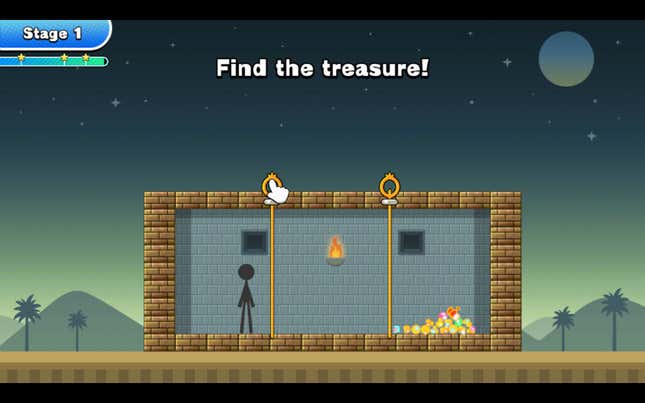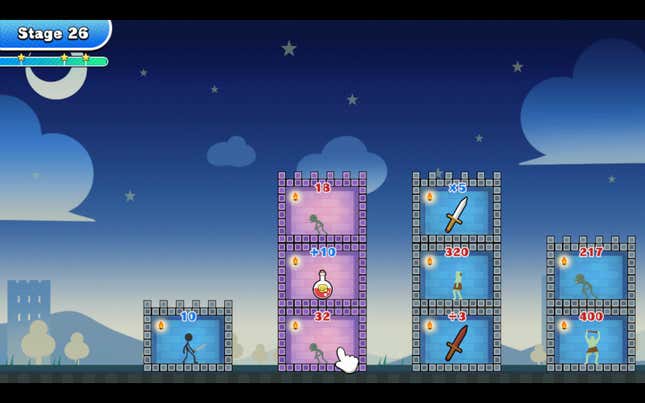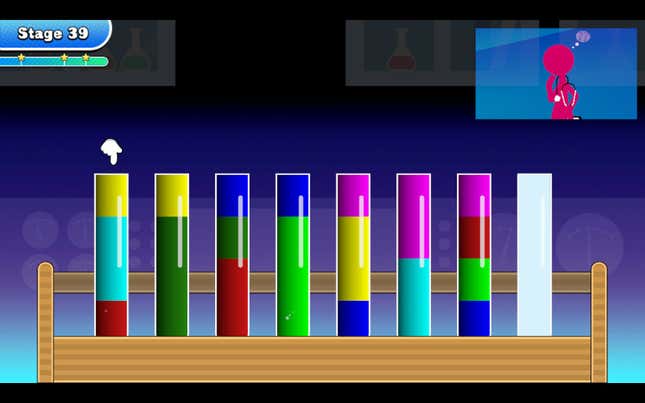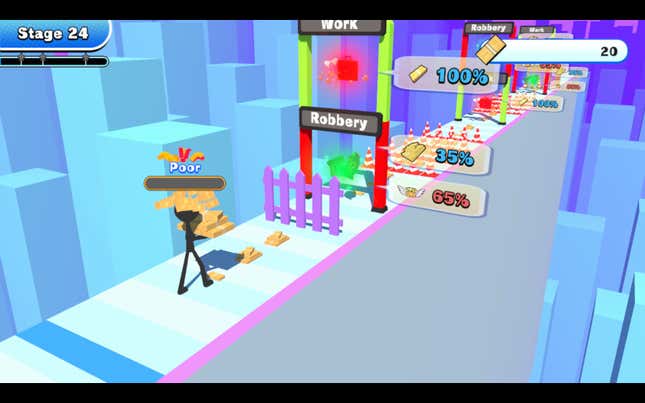
Every Friday, A.V. Club staffers kick off our weekly open thread for the discussion of gaming plans and recent gaming glories, but of course, the real action is down in the comments, where we invite you to answer our eternal question: What Are You Playing This Weekend?
It’s the sort of wish you might ask for from a very tired, very tiny genie: Why the hell can’t I actually play the fun-looking games in all those deceptive mobile game ads?
You know the ones—they infest Facebook like some sort of crappy, anime-animated parasite: “Pull the pin to save the princess!” “Can YOU separate out the liquids?” “Kill the monsters using a basic application of elementary school math!” Popping up every two stories betwixt your friends’ kids photos, and your relatives’ latest conspiracy-laden screeds, the ads in question all feature the same ugly art, the same over-blown marketing copy, and the same videos of some total idiot blowing the puzzle when the solution is right there. And then, if you give in to your basal urges and actually download the stupid thing, you find out that it’s just another dumb Clash Of The Clans clone that might include two seconds of the advertised game as a bonus round or somesuch. It’s endlessly frustrating, in a “My life clearly doesn’t have enough actual problems to worry about” sort of way.

YEAH! YOU WANT “THOSE GAMES,” RIGHT? SO HERE YOU GO! NOW, LET’S SEE YOU CLEAR THEM! is, as its meme-ily long name suggests, an attempt to scratch that very particular itch. Created by developer Monkeycraft—best known, at this point, for doing a decent job of remastering the first two Katamari games for modern consoles—the game does exactly what it promises: Lets you pull all those pins, move all those cars, pour all those fluids, etc. And what it ends up proving, by doing so, is what you may have suspected all along: That one of the reasons that developers don’t actually make most of these games is that, while they undeniably look neat, they’re just not robust enough ideas to support an entire title.
The first 15 minutes spent with YYWTGRSHYGNLSYCT are a genuine kick, undeniably, a release of multiple years of online gaming frustrations. “Finally,” you think to yourself, “I get to pull that pin!” And to be fair, Pull The Pin—in which you must pull a series of building-sized needles out of various dungeons to open paths to treasure and kill monsters, for your hapless hero—is the best, and most built-out game in this minigame collection. There are enough quirks to the system, and enough room for expansion on the basic idea, that the 100 levels included in the pack could genuinely kill an hour or two for a lot of players. It helps that there’s an actual game there, as you work out which rock to drop on which goblin, or which door to open when to secure your route to the loot. It’s always looked fun in those ugly little Facebook windows, and, as it turns out, it actually, kind of, is.

The same can’t be said for most of the other games in the collection, though. “Number Tower,” for instance, really is just about very basic applications of math: Get your number higher to beat the numbers of the monsters, repeat for 25 levels, never play again. “Color Lab” is actually kind of satisfying, as you move around brightly colored liquids like a damper version of the Towers Of Hanoi. But, again: Only 25 levels, and once you get the gimmick, it never evolves. “Parking Lot” features all the excitement of the old “slide the block” puzzles it listlessly emulates. And while “Cash Run” is actually pretty fun—it’s the one where you pick up brick-esque piles of money off the ground and use them to make platforms and stars to climb over obstacles and pass through gates representing money-granting life decisions—it also only has 25 levels, and never evolves into more than a neat distraction.

And that’s YYWTGRSHYGNLSYCT in a nutshell: A very amusing hour, and not much else. It doesn’t help that the game doesn’t steer into its satirical roots as hard as it could: The games themselves basically look right, but they lack that irritating-irresistible flair that instinctively draws the eye in the real ads. (The decision to use stickmen instead of that one generic anime dude who always looks so sad might make sense from a technical point of view, but it loses some of the idiot appeal of the product.) If you really, really need to pull the pin, you’ll be happy enough—and if you have $10 to toss at a cleverly executed joke game, it’ll be much the same. But ultimately, it’s a stark reminder of why these games exist mostly in the hypothetical, rather than in the real world.